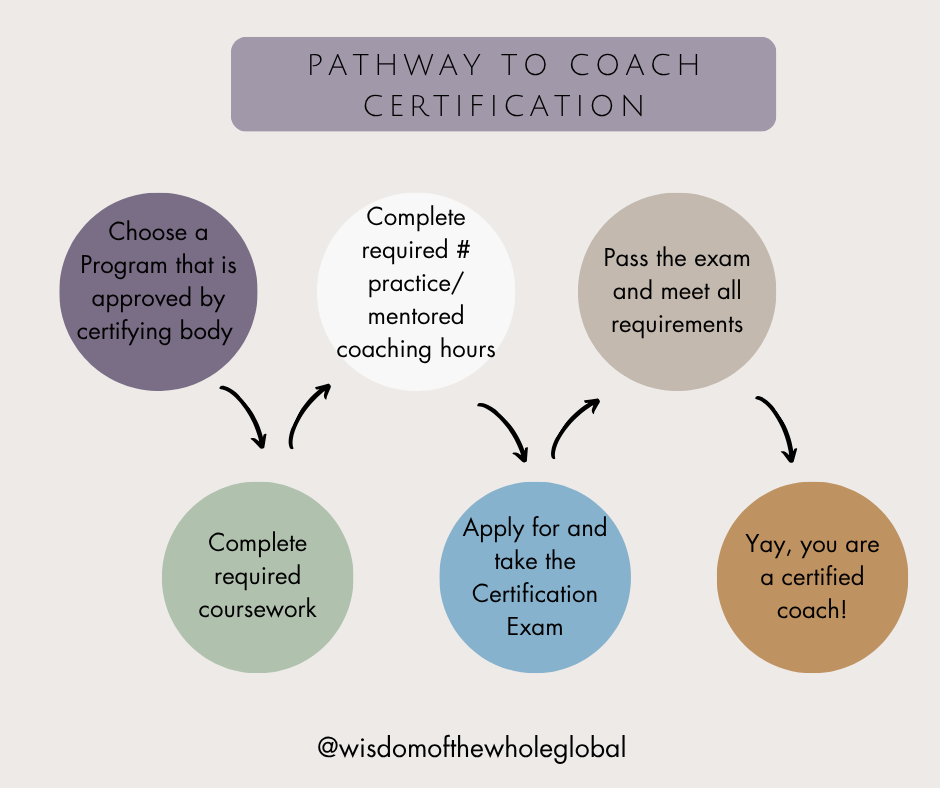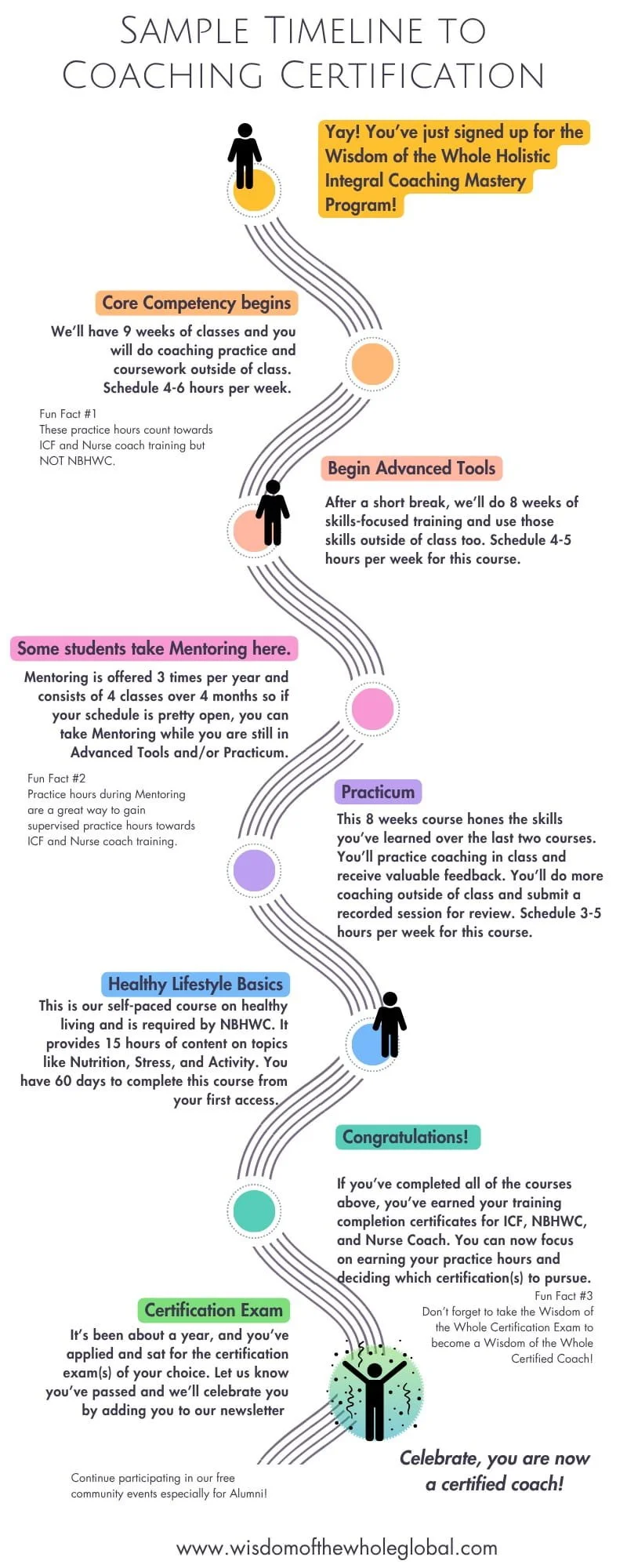The Ultimate Guide to Coach Training and certification
Everything You Need to Know About Coach Training and Certification
Table of Contents
Introduction: Why Does the Coach Training and Certification Matter?
What is Coaching? What is Coach Training?
How to Choose the Right Coach Training Program
Types of Certifications: Which One is Right for You?
The Process to Become a Certified Coach
What to Expect from a Coach Training Program
Cost of Coach Training and Certification
Most Recognized Coaching Certifications for Health and Life Coaching
Conclusion
Introduction: Why Does the Coach Training and Certification Matter?
If you are considering becoming a health or life coach to change or enhance your career, obtaining a coach certification signals to clients, employers, and peers that you have met established professional standards. It's like a seal of approval that says, “This person knows what they’re doing, and is qualified. I can trust them.” In a field where anyone can technically call themselves a coach, credentials set trained professionals apart. Investing in certification shows that you are serious about your offerings—not just dabbling. It’s a sign that you have put in the time, money, and effort to develop yourself professionally.
Before jumping in with both feet and calling yourself a “Coach”s, let’s discuss the benefits that coach training and certification can provide. Accredited coach training includes training on coaching skills, as well as industry standards and principles of coaching ethics, confidentiality, and professional coaching conduct. Coaches often work with clients who have deeply personal goals and challenges, so having a well-established framework to guide those conversations is essential to building trust with clients and delivering impactful coaching results. Accredited coach training also equips coaches with evidence-based tools, frameworks, and models that improve client outcomes. While artful and fluid on the surface, masterful coaching is supported with a solid process for listening deeply, helping clients shift perspectives, asking powerful questions, and supporting sustainable change. Training also helps coaches recognize when an issue is outside their scope of practice (e.g., mental health conditions) and when they need to refer clients to the appropriate other professionals. This professional boundary ensures clients are getting the best possible, and most appropriate care. In a competitive and diverse coaching industry, certification serves as a badge of trust and professionalism.
Some coaching certification programs also connect their students and graduates with a larger community of peers and mentors. This support network helps with ongoing growth, learning, referrals, and collaboration opportunities.
Corporate and private clients, HR teams, and organizations are increasingly looking for certified coaches. A coach certification opens doors to coaching within organizations, listings in coaching directories, and eligibility for partnerships with coaching platforms or firms apart from the option of starting a private practice.
Photo Source: Unsplash
What is Coaching? What is Coach Training?
Coaching is a professional, collaborative process that helps individuals bridge the gap between where they are now and where they want to be in their personal or professional lives. Unlike therapy, which focuses on addressing past trauma and mental health issues, or consulting, which provides expert advice, coaching focuses on goal setting, action planning, and forward movement. A coach partners with clients to unlock their potential, overcome limiting beliefs, and create sustainable change through guided conversations and accountability. Whether it’s in the context of life coaching, health coaching, or career coaching, the core of coaching is empowering clients to discover their own solutions and take meaningful steps toward their desired outcomes. Effective coaching is rooted in active listening, powerful questioning, and a commitment to personal growth.
In an accredited coach training program, coaching students develop a wide range of skills that are essential for effective and impactful coaching. Common skills include active listening, which helps coaches fully understand their clients’ needs, and powerful questioning, which encourages their clients to explore deeper self-reflection and build clarity. Trainees also learn goal-setting techniques, motivational strategies, and how to foster accountability in their clients. Other key skills include emotional intelligence, mindset coaching, communication skills, and behavior change methods, amongst others. As mentioned previously, accredited coach training programs also cover coaching ethics and how to build a strong coach-client relationship. These foundational skills prepare future coaches to support clients in achieving personal, health, career, or business goals with confidence and professionalism.
Today, there are many different types of coaching available, each designed to support individuals in specific areas of their lives. Life coaching focuses on personal growth, goal setting, and creating more balance and fulfillment. Health coaching helps clients improve their physical well-being through better habits around nutrition, exercise, and stress management. Career coaching is ideal for those seeking guidance in professional development, job transitions, or leadership skills. Business coaching supports entrepreneurs and small business owners in growing their companies and improving performance. Other popular types include executive coaching, relationship coaching, and wellness coaching. Each coaching niche offers unique benefits, and choosing the right one depends on a client’s goals and the expertise of the coach. Whether someone is looking to overcome obstacles, make lasting lifestyle changes, or achieve success in a specific area, there's a coaching style tailored to meet those needs.
How to Choose the Right Coach Training Program
Choosing the right coach training program is a crucial step for anyone looking to become a certified coach and build a successful coaching practice.
Start by considering your area of interest—whether it’s life coaching, health coaching, or another niche—and look for programs that can best support you in your field and meet or exceed the training requirements for the specific certification(s) that you would like to obtain after graduation.
Choose a program that is accredited by a recognized organization, such as the International Coaching Federation (ICF), the National Board for Health & Wellness Coaching (NBHWC), or the American Holistic Nurses Credentialing Corporation (AHNCC), to ensure it meets industry standards.
Look at the curriculum, format (online or in-person), mentorship opportunities, and whether the program offers practical coaching experience.
Review graduate success stories and support for launching your coaching practice after certification.
The right training should align with your goals, values, and preferred learning style, setting you up for long-term success as a professional coach. If you aren’t sure yet about which coaching certification you would like to obtain, look for coach training that is accredited by multiple organizations so that you are not limited after you graduate.
Types of Certifications: Which One is Right for You?
There are several recognized coach certification options, each designed to suit different coaching paths and professional goals. The National Board for Health & Wellness Coaching (NBHWC) offers certification for those focused on well-being, health and wellness, emphasizing science-based practices and behavior change strategies — ideal for individuals who want to support clients in lifestyle transformation.
The International Coaching Federation (ICF) is one of the most widely respected organizations in the coaching industry, offering credentials for life coaching, executive coaching, and business coaching through rigorous training and experience requirements. This may also be a good option for anyone outside of the United States who would like to pursue coaching certification.
For nurses seeking to integrate coaching into their clinical or holistic practice, the American Holistic Nurses Credentialing Corporation (AHNCC) offers Nurse Coach Certification, blending traditional nursing with coaching to promote healing and wellness.
Choosing the right certification depends on your background, area of interest, and career goals. Whether you're drawn to health and wellness, personal development, or integrative care, there's a pathway that aligns with your passion and expertise.
Ask yourself the following questions:
What excites you most about coaching?
What part of your professional background or lived life experiences do you want to incorporate into your coaching?
What type of clients do you want to work with?
What unique world view or philosophical perspective is important to you?
Consider your answers and think about which certification aligns best with your goals and vision.
The Process to Become a Certified Coach
The process to become a certified coach typically involves several key steps, starting with choosing the right coaching training institute that aligns with your goals and meets certification requirements from a recognized organization like the ICF, NBHWC, or AHNCC. Once enrolled in an approved training program, you'll complete coursework covering core coaching competencies, communication skills, and ethical guidelines. Most programs also include hands-on practice through mentor coaching, peer sessions, or supervised coaching hours.
After completing the required training hours and gaining practical experience, you'll be eligible to apply for certification, which may involve passing an exam and submitting documentation of your coaching practice (the number of client coaching hours depends on the credentialing organizations’ standard requirements). Once certified, you can begin building your coaching practice, incorporate coaching into your current workplace, or get a new role within a company that hires internal coaches.
This structured journey ensures that you’re fully prepared to coach clients effectively and confidently.
What to Expect from a Coach Training Program
When you enroll in an approved coach training program, you can expect a comprehensive and structured experience that prepares you for a successful coaching career. Training programs typically begin with foundational coursework on coaching ethics, effective communication, active listening skills, as well as behavior change techniques and goal-setting strategies. As you progress through the program, you’ll dive deeper into the practice of coaching and how to apply your knowledge to real-life coaching scenarios. Many programs include practical elements such as mentor coaching, where experienced coaches provide feedback on your technique, and peer coaching, giving you the opportunity to practice and refine your skills even further. Expect a blend of self-paced learning, live sessions, and hands-on practice, all designed to build your confidence and competence. Upon completion, you will have the training requirements to sit for certification exams and begin coaching clients with a solid foundation in coaching methodologies and industry best practices. Before enrolling, make sure your coach training program meets or exceeds the training requirements for the coaching certification(s) you would like to pursue after graduation.
Cost of Coach Training and Certification
The cost of health and life coach training from accredited organizations can vary significantly based on the program's depth, duration, and credibility. On average, prospective coaches can expect to invest anywhere from $2,500 to $12,000 for a reputable certification. For example, programs accredited by the International Coaching Federation (ICF) or the National Board for Health & Wellness Coaching (NBHWC) often fall in the $4,000 to $10,000 range. Shorter or self- paced programs might be more affordable, however comprehensive, in-depth training with mentorship, live sessions, and business support typically come at a higher price point. While it’s a considerable investment, many aspiring coaches view it as a strategic step toward building a meaningful, flexible, and impactful career. Certified coaches may charge anywhere from $75 to $300+ per session, depending on their level of experience and focus of practice, and with a steady client base, it may be possible to recoup training costs within the first year of practice. Beyond the financial ROI, graduates also gain personal fulfillment and the flexibility to design a career that aligns with their values and lifestyle. Some programs also offer financial assistance, or payment plans to make the investment more accessible.
Most Recognized Certifications for Health and Life Coach Training
When it comes to becoming a trusted health or life coach, earning a certification from a well-recognized organization can make a big difference in credibility and career opportunities. For life coaching, the International Coaching Federation (ICF) is widely regarded as the gold standard, offering three levels of certification—ACC, PCC, and MCC—based on experience and training hours. In the health and wellness coaching space, the National Board for Health & Wellness Coaching (NBHWC) is a leading authority, especially for those looking to work in healthcare settings or with integrative health professionals. Nurses looking to integrate coaching into their practice may want to explore certifications through the American Holistic Nurses Credentialing Corporation (AHNCC), which offers board certification for Nurse Coaches with a holistic, patient-centered focus. When choosing a certification pathway, consider factors like accreditation, program length, cost, delivery format, and post-graduation support before making your decision. The right certification should not only align with your passion but also help carve out your niche and attract your ideal clients.
Programs approved by these organizations typically meet rigorous standards in coaching methodology, ethics, and practice. Choosing a certification from a recognized body not only enhances your skills but also opens the door to more professional opportunities and client trust.
Conclusion
Becoming a certified health or life coach is a journey of personal and professional growth. With the right training and credentials, you’ll be equipped to empower others, unlock potential, and make a lasting impact in the lives of your clients. Whether you’re interested in life, health, career, or business coaching, certification opens doors to new opportunities and helps establish credibility in an increasingly competitive market. Ready to take the next step? Start exploring coach training and certification options today and begin the journey to becoming a certified coach.




